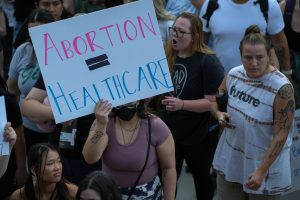- Slug: BC-CNS Post-Roe Care, 1550 words.
- 3 photos and captions below.
- 1 video here, credit Daisy Gonzalez Perez/Cronkite News
By Adriana Gonzalez-Chavez
Cronkite News
PHOENIX – In a post-Roe world, those seeking an abortion will have to live in, or travel to, a state where it’s legal. But those who forgo the procedure may need help with an unplanned pregnancy.
Activists and organizations on both sides of the abortion debate are figuring out how best to help pregnant people after the U.S. Supreme Court overturned the landmark 1973 ruling that had legalized abortion across America.
In states with abortion restrictions on the books, procedures ground to a halt after the Friday ruling.
Planned Parenthood Arizona immediately stopped performing abortions at its seven clinics statewide. In a video conference call Friday, Dr. Jill Gibson, the group’s medical director, described how staff had to call patients to explain that appointments had been canceled. Others had already arrived for procedures.
“There was complete dismay,” she said.
Gibson stressed that those most likely to be left to contend with an unplanned or unwanted pregnancy are people who have neither the means nor ability to travel for an abortion – “those who already face discriminatory and systemic obstacles to health care, particularly our Black, Indigenous and communities of color, people with disabilities, people who live far from the city, young people, poor people, undocumented people.”
“My heart honestly is breaking, because this decision will cause immense suffering for women and for their families,” she said. “We will see desperation.”
A complicated landscape
More than 76% of women 18 to 49 years old are at risk for unintended pregnancies, according to the Centers for Disease Control and Prevention. And the vast majority of people seeking abortion care are unmarried and poor, the agency reports.
People of color also are disproportionately represented, with Black and Hispanic people seeking abortions at higher rates than white people.
With Roe no longer the law of the land, “26 states are certain or likely to ban abortion,” according to the Guttmacher Institute, a research organization that supports abortion rights. Those states either have old bans still on the books – as Arizona does – or so-called trigger laws to automatically outlaw abortion now that the high court has ruled.
Already, abortion bans have taken effect in states including Utah, South Dakota, Kentucky and Louisiana. Some bans stipulate exceptions in cases of rape or incest. Some, including Louisiana’s law, do not.
Arizona’s situation is less clear: In March, Gov. Doug Ducey signed into law a bill banning abortions after 15 weeks. That takes effect at the end of September. But there’s also a law from 1901 that bans abortion outright, except to save the life of the mother. Experts said the courts may have to weigh in to determine whether the old law can stand.
Practically speaking, however, abortion has ceased in Arizona and on a much larger level, with providers in many states stopping procedures over uncertainty around the legal landscape.
This new world order has prompted those who both support and oppose abortion to pledge to help people with unintended pregnancies navigate the situation and get the care they need.
Some organizations are working to provide financial help and transportation for those seeking an abortion in a state where it’s legal. At the same time, other groups are taking steps to help those who may carry their pregnancies to term.
‘Their lives matter’
Even before Roe was overturned, the Rev. Daniel Kanter, senior minister and CEO of First Unitarian Church of Dallas, was organizing trips to take impoverished women in need of abortions from Texas to New Mexico.
The effort began after Texas last fall made abortion illegal after six weeks gestation. Now, beginning 30 days after the Supreme Court’s June 24 ruling, all abortions will be illegal in Texas except to save the life of the mother.
Kanter told Cronkite News that so long as out-of-state travel for abortions remains legal, “we expect to continue as usual.”
“The motivation is knowing that the patients are going through all kinds of things, that these are the poorest people in our community – they’re mostly Black, brown and Indigenous women – and that they have dignity and their lives matter,” he said.
If those individuals can’t get abortions, he added, “their lives will get more difficult.”
“They’ll be poorer. In some cases, these births won’t work and they’ll hurt or kill the mother. … And as a clergy person, I can give some spiritual care and utilize my position to protect and serve these people.”
Abortion fundraising groups across the nation also have vowed to help women who want an abortion get to states where it’s legal.
“Roe v. Wade is gone, but we are still here,” the Tucson Abortion Support Collective said in an email after Friday’s ruling. So far this year, the collective has provided more than $23,000 to cover abortions, including some out of state.
Eloisa Lopez, who heads the Abortion Fund of Arizona, said her organization is exploring how to help ease the burden of so-called “receiving states” and add resources and infrastructure so clinics can handle the influx of patients.
But she noted that donations alone won’t ensure that all who are seeking abortions will get one.
“Even if we have all the financial resources to support them, there’s other barriers,” she said. “They have families, they have jobs, they’re not going to be able to leave. Or, depending on their citizenship status, it may not be safe.
“The reality is many people are going to fall through the cracks.”
‘Ready to push forward’
Among abortion opponents, promises to do more to help pregnant people have become a common refrain since Friday’s ruling.
State Sen. Nancy Barto, R-Phoenix, who sponsored Arizona’s new ban on abortions after 15 weeks, took to Twitter on Friday to tout other legislative measures meant to help those unable to get an abortion – including a provision to expand Medicaid coverage from 60 days after giving birth to one year.
“In anticipation of this day, the Arizona Legislature increased budget resources to care for both the pregnant woman and her unborn child – including for pre- and post-natal care,” Barto tweeted. “Plus there are nearly 50 pregnancy resource centers ready to serve them – at no cost.”
She included the hashtag: #LoveThemBoth.
Josh Chumley, chief advancement officer for Choices Pregnancy Centers of Greater Phoenix, said the organization’s clinics in Glendale, Mesa and Phoenix are prepared to help those who now can’t get a legal abortion.
The centers offer free pregnancy tests and ultrasounds, as well as emergency baby supplies.
“We’re ready to push forward,” he said.
Daniel Breeden, executive director of Operation Saving Life in Nashville, Tennessee, said he expects more women will seek services post-Roe.
His organization works with people who decide to continue their pregnancies instead of ending them. The group provides emotional and financial support, he said, as well as help with adoption services, and it works with women for as many as three years after they give birth.
“It’s time for us to put our money where our mouth is,” Breeden said. “We want to take care of women who are abortion-minded, so when there is a lesser opportunity for (abortions) to happen, then there’s going to be an influx of women … and we want to be ready for that.”
Heather Gardner is executive director of Central Texas Coalition for Life, a group whose volunteers work to persuade those seeking abortions to change their minds.
Her organization works with about 20 pregnancy resource centers that offer free diapers, maternity clothes, formula and other necessities, as well as job training programs and breastfeeding classes. The centers also partner with local clinics to get those in need free or reduced-cost health care.
“Our volunteers are passionate, many of them having had abortions themselves,” Gardner said. “They want to turn around and be a source of great help for families that may need help – men and women.”
In a post-Roe world, Gardner expects such centers to vastly expand.
“In Texas, what our leaders and centers have been discussing for many years now and working towards is a higher clientele volume,” she said. “That means you’re going to need more staff, you’re going to need more volunteers … you’re going to need to expand your hours, if possible.
“You just really have to rethink how you operate.”
Gardner said that from her experience, lack of childcare and housing are two common concerns she’s heard from those considering ending a pregnancy.
“If there is a need, if there is a gap, let’s work to fill that gap,” she said. “Let’s work together with people who want to help families get on their feet.”
Others note it’s more complex.
Dr. Victoria Fewell, a Tucson OB-GYN who heads the abortion rights group Arizonans for Reproductive Freedom, worries that pregnant people seeking abortions for medical reasons will face worsening conditions by continuing their pregnancies.
“There are many women with chronic medical disorders who seek abortion,” Fewell said. “Their current medical condition could become worse by pregnancy and even become life-threatening. And in those instances we will be forced to wait until they are critical.
“It’s imperative that women have comprehensive access to reproductive health care and that they have a say in their own reproductive future. And the law that is likely to go into effect in Arizona is going to be devastating for those women.”
For more stories from Cronkite News, visit cronkitenews.azpbs.org.
^__=


